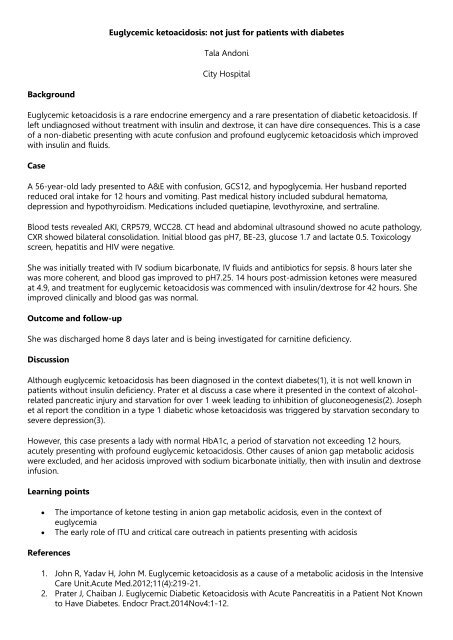Case Report ABSTRACTS
Case-Report-Abstracts
Case-Report-Abstracts
You also want an ePaper? Increase the reach of your titles
YUMPU automatically turns print PDFs into web optimized ePapers that Google loves.
Euglycemic ketoacidosis: not just for patients with diabetes<br />
Tala Andoni<br />
City Hospital<br />
Background<br />
Euglycemic ketoacidosis is a rare endocrine emergency and a rare presentation of diabetic ketoacidosis. If<br />
left undiagnosed without treatment with insulin and dextrose, it can have dire consequences. This is a case<br />
of a non-diabetic presenting with acute confusion and profound euglycemic ketoacidosis which improved<br />
with insulin and fluids.<br />
<strong>Case</strong><br />
A 56-year-old lady presented to A&E with confusion, GCS12, and hypoglycemia. Her husband reported<br />
reduced oral intake for 12 hours and vomiting. Past medical history included subdural hematoma,<br />
depression and hypothyroidism. Medications included quetiapine, levothyroxine, and sertraline.<br />
Blood tests revealed AKI, CRP579, WCC28. CT head and abdominal ultrasound showed no acute pathology,<br />
CXR showed bilateral consolidation. Initial blood gas pH7, BE-23, glucose 1.7 and lactate 0.5. Toxicology<br />
screen, hepatitis and HIV were negative.<br />
She was initially treated with IV sodium bicarbonate, IV fluids and antibiotics for sepsis. 8 hours later she<br />
was more coherent, and blood gas improved to pH7.25. 14 hours post-admission ketones were measured<br />
at 4.9, and treatment for euglycemic ketoacidosis was commenced with insulin/dextrose for 42 hours. She<br />
improved clinically and blood gas was normal.<br />
Outcome and follow-up<br />
She was discharged home 8 days later and is being investigated for carnitine deficiency.<br />
Discussion<br />
Although euglycemic ketoacidosis has been diagnosed in the context diabetes(1), it is not well known in<br />
patients without insulin deficiency. Prater et al discuss a case where it presented in the context of alcoholrelated<br />
pancreatic injury and starvation for over 1 week leading to inhibition of gluconeogenesis(2). Joseph<br />
et al report the condition in a type 1 diabetic whose ketoacidosis was triggered by starvation secondary to<br />
severe depression(3).<br />
However, this case presents a lady with normal HbA1c, a period of starvation not exceeding 12 hours,<br />
acutely presenting with profound euglycemic ketoacidosis. Other causes of anion gap metabolic acidosis<br />
were excluded, and her acidosis improved with sodium bicarbonate initially, then with insulin and dextrose<br />
infusion.<br />
Learning points<br />
<br />
<br />
The importance of ketone testing in anion gap metabolic acidosis, even in the context of<br />
euglycemia<br />
The early role of ITU and critical care outreach in patients presenting with acidosis<br />
References<br />
1. John R, Yadav H, John M. Euglycemic ketoacidosis as a cause of a metabolic acidosis in the Intensive<br />
Care Unit.Acute Med.2012;11(4):219-21.<br />
2. Prater J, Chaiban J. Euglycemic Diabetic Ketoacidosis with Acute Pancreatitis in a Patient Not Known<br />
to Have Diabetes. Endocr Pract.2014Nov4:1-12.




